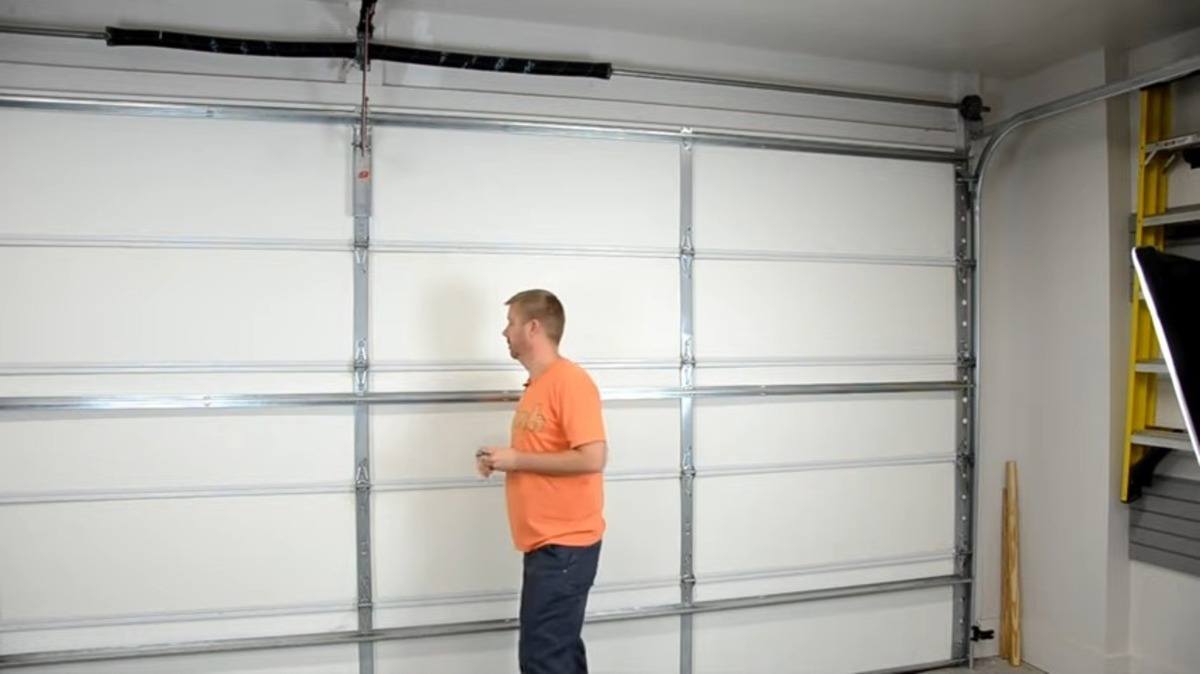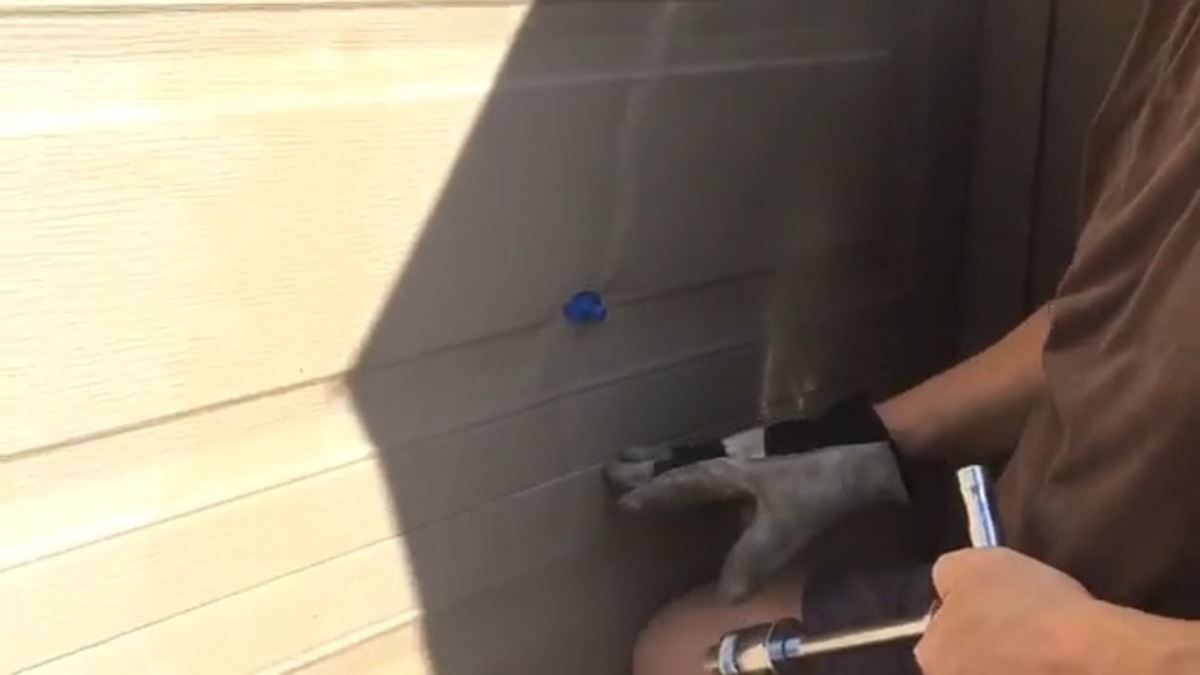Affiliate Disclosure: We may earn money or products from the companies mentioned in this post.
Your garage door is essential to your home, providing security, convenience, and curb appeal. However, accidents happen, and dents can occur, leaving you wondering if your dented garage door can be repaired. The good news is that, in many cases, dents in garage doors can indeed be fixed, restoring both the functionality and appearance of your door.
This comprehensive guide will explore the possibilities of repairing a dented garage door. Whether you’re facing a minor dent from a mishap or a more significant dent caused by a collision, we’ll delve into the feasibility of repair, the methods available, cost implications, and considerations for DIY enthusiasts and those seeking professional assistance.
Can a Dented Garage Door Be Repaired?
Yes, a dented garage door can often be repaired. The repairability of a dented garage door depends on factors such as the severity of the dent, the door’s material and construction, and the available repair methods. For minor dents, do-it-yourself techniques like using hot water and a plunger, applying heat and cold, or gently tapping with a mallet and wooden block may suffice.
However, seeking professional repair services for more severe or complex dents is advisable. Professional technicians have the expertise and specialized tools to fix dented garage doors effectively. The repair cost will vary based on the extent of the damage, the repair method employed, and whether you choose to do it yourself or hire professionals. Timely repair is essential to prevent further damage and maintain the functionality and longevity of your garage door. Assessing the dent, considering the options, and consulting a professional to determine the best course of action is recommended.
Step-by-Step Guide on How To Fix A Dented Garage Door
The good news is that, in most cases, you can repair a dented garage door and restore its appearance and functionality without replacing the entire door.
Step 1: Gather the Necessary Tools and Materials
Before starting the repair, ensure you have the following tools and materials:
- Safety goggles and gloves
- Clean cloth or sponge
- Bucket of warm water
- Mild detergent or dish soap
- Hairdryer or heat gun
- Compressed air canister (optional)
- Rubber mallet or hammer
- Wooden block or scrap wood
- Sandpaper (medium and fine grit)
- Automotive body filler
- Putty knife or scraper
- Primer
- Paint that matches your garage door color
Step 2: Clean the Dented Area
Clean the dented area to remove dirt, debris, or grease. Dampen the clean cloth or sponge with warm water and mild detergent.
Gently wipe the dented surface to ensure it is free from any contaminants. Rinse the area with clean water and allow it to dry completely.
Step 3: Apply Heat to the Dent
Applying heat to the dented area using a hairdryer or heat gun on low to medium heat. Move the heat source back and forth across the dent for a few minutes. The heat will cause the metal to expand slightly, making it easier to manipulate.
Step 4: Massage the Dent from the Inside
If possible, access the backside of the dented panel. Use your hands or a rubber mallet to massage the dent carefully outwards. Apply gentle pressure and work circularly until the dent is pushed back into place. Alternatively, you can place a wooden block or scrap wood against the backside of the dent and tap it with a rubber mallet or hammer to pop the dent out.
Step 5: Level the Surface
After removing the dent, the surface may still have minor imperfections. Use sandpaper with medium grit to level the area around the dent.
Start with gentle strokes and gradually increase the pressure until the surface is smooth. Switch to fine-grit sandpaper to achieve a finer finish.
Step 6: Apply Automotive Body Filler
If there are noticeable dings or unevenness in the repaired area, apply a thin layer of automotive body filler.
Mix the filler according to the manufacturer’s instructions and spread it evenly over the dented area using a putty knife or scraper. Allow the filler to dry completely, following the recommended drying time.
Step 7: Sand and Prime the Filled Area
Once the filler is dry, use sandpaper to smooth the filled area. Start with medium-grit sandpaper and transition to fine grit for a polished finish.
Wipe away any dust or residue. Apply a primer to the repaired area to ensure proper paint adhesion.
Step 8: Paint the Repaired Area
Apply several thin coats of paint to the repaired area using paint that matches your garage door color. Follow the manufacturer’s instructions for drying time between coats. Allow the paint to dry completely before operating the garage door.
Step 9: Test the Garage Door Functionality
Test the garage door after the paint has dried to ensure it opens, closes, and locks properly. Check for any abnormalities or issues that may have arisen during the repair process. If everything functions correctly, you have successfully fixed your dented garage door.
Factors Influencing the Cost of Garage Door Dent Repair

When faced with a dented garage door, one of the primary concerns that arise is the cost of repair. Understanding the factors that influence the cost of garage door dent repair is crucial for making informed decisions and planning your budget.
- The severity of the Dent: The dent’s severity is a crucial factor in determining the repair cost. Small dents or minor cosmetic imperfections can often be repaired more affordably. However, extensive or deep dents affecting the door’s structural integrity may require more extensive repairs or panel replacement, resulting in higher costs.
- Material and Construction: The material and construction of your garage door play a significant role in cost determination. Different materials, such as steel, aluminum, or wood, have varying costs for dent repair. Additionally, the construction of the door, such as single-layer, double-layer, or insulated doors, can affect the complexity of the repair and subsequent costs.
- Accessibility and Location of the Dent: The accessibility and location of the dent on the garage door can influence the repair cost. If the dent is located in an easily reachable area, the repair process may be simpler and less time-consuming, potentially reducing the overall cost. However, if the dent is in a hard-to-reach spot or obstructed by other components, it may require more effort, specialized tools, and additional labor, resulting in higher costs.
- Need for Panel Replacement: In some cases, severe dents or damages may require panel replacement rather than simple repairs. The panel replacement cost can vary depending on the specific garage door model, the panel’s material, and the installation’s complexity. Replacing an entire panel can be more expensive compared to repairing small dents.
- Additional Repairs or Components: During the inspection of your garage door, other issues or components may require attention. For example, if the dent has affected the tracks, hinges, springs, or cables, these components may need repair or replacement, adding to the overall cost. Considering these potential additional repairs is important when estimating the total expense.
- Professional Expertise and Labor Costs: The garage door dent repair cost also depends on the expertise and reputation of your chosen repair service. Established and experienced professionals may charge higher rates due to their skill level, industry knowledge, and quality of service. Labor costs can vary depending on the complexity of the repair, the time required, and the service provider’s location.
- Geographical Location: Geographical location can influence the garage door dent repair cost. The cost of living, regional market rates, and competition among service providers can all impact pricing variations. Urban areas or regions with a higher cost of living may have slightly higher repair costs than rural areas.
Can I Repair a Dented Garage Door Myself?
It is possible to repair a dented garage door yourself, depending on the severity of the dent and your level of DIY skills. You can try several DIY methods to remove or minimize the dent. One method involves using hot water and a plunger. You can make the metal more flexible by heating and pouring the water over the dented area. Then, using the plunger, you can create suction and pull the dent outward.
Another DIY technique involves applying heat and cold. You can use a hairdryer or a heat gun to heat the dented area, followed by using compressed air in a can (turned upside down) to spray the area, causing it to cool rapidly. This temperature contrast can sometimes cause the dent to pop back into place.
Additionally, you can attempt to gently tap out the dent using a mallet or hammer and a wooden block. Place the block against the inside of the dent and tap it with the hammer to gradually push the metal back into shape.
How Much Does it Cost to Repair a Dented Garage Door?
The cost of repairing a dented garage door can vary depending on several factors. Minor dents that are superficial and easily repairable may require minimal expenses. In such cases, do-it-yourself (DIY) methods can be effective and cost-efficient using household tools like a plunger or heat and cold techniques.
However, hiring a professional garage door repair service is often necessary if the dent is more severe or if the DIY methods are unsuccessful. The cost of professional repair can be influenced by factors such as the damage’s extent, the garage door’s type and material, and the location.
On average, professional dent repair for a garage door can range from $150 to $500. This estimate includes the service fee, labor costs, and any necessary materials. Keep in mind that this is a general price range and can vary depending on your specific circumstances and geographic location.
It’s important to note that if the dent is extensive and has caused significant damage to the door, replacing the dented panel or even considering a new garage door may be more cost-effective in the long run.
To get an accurate cost estimate for repairing a dented garage door, it is advisable to consult a professional repair service. They can assess the damage and provide a more precise quote based on the specific requirements of your garage door.
How Long Does it Take to Repair a Dented Garage Door?
The duration required to repair a dented garage door can vary depending on several factors. The complexity of the dent, the chosen repair method, and whether you’re opting for a DIY approach or hiring a professional will all influence the timeframe.
For minor dents, such as small creases or shallow indentations, you may be able to address the repair yourself relatively quickly. DIY methods like using hot water and a plunger or applying heat and cold techniques can be completed within a matter of hours or even minutes. However, it’s important to note that these methods may not be as effective for larger or more severe dents.
If you decide to enlist the services of a professional garage door repair company, the repair timeframe will depend on their availability and workload. Professional repairs for dented garage doors can typically be completed within a few hours or, in some cases, within the same day. Professionals have the expertise, specialized tools, and knowledge to assess and repair dents efficiently.
Are There Any Risks Involved In Attempting a DIY Repair?
Yes, there are risks involved in attempting a DIY repair on a dented garage door. While DIY repairs can be cost-effective and give you a sense of accomplishment, it’s important to consider the following risks:
- Safety hazards: Working with garage doors can be dangerous, especially if you’re unfamiliar with the mechanisms and proper safety procedures. Mishandling springs, cables, or heavy door panels can lead to injuries. Professional repair technicians have the knowledge and experience to handle these risks safely.
- Further damage: Without the right tools, techniques, and understanding of the door’s construction, there’s a possibility of causing additional damage to the door or its components. This can worsen the dent or lead to functional issues, resulting in more costly repairs.
- Voiding warranties: Many garage doors have warranties that may be voided if unauthorized repairs are attempted. This means that if you cause any damage or the door malfunctions due to DIY repairs, you may be unable to claim warranty coverage.
- Lack of expertise: Professional repair technicians have extensive training and experience handling various garage door repairs. They possess the knowledge to assess the damage accurately, determine the most effective repair methods, and ensure the job is done properly. DIY repairs may lack the same level of expertise, leading to suboptimal results.
Conclusion
Repairing a dented garage door is possible and can save you from the hassle and expense of replacing the entire door. Whether you tackle the repair or hire a professional, options are available to restore your garage door’s functionality and aesthetics.
While DIY repair methods can be effective for minor dents, it’s essential to prioritize safety and have the necessary tools and expertise. For complex or extensive dents, seeking the assistance of a professional garage door repair company is often the best course of action. Professionals have the skills, experience, and specialized equipment to ensure a proper and lasting repair.
If left unrepaired, a dented garage door can lead to further functional issues and potential safety risks. It is crucial to address dents promptly to maintain the door’s optimal performance and longevity.


